Antony Blinken’s visit – his second to China is less than a year – is the clearest proof that the U.S. Secretary of State was sent to beg the Chinese again. But as expected, nothing can be achieved from such visits as long as Washington arrogantly thinks it could tell Beijing what China can or cannot do, or who the Chinese can or cannot make friends with.
With tail between legs, Blinken was sent home after being given an earful by Chinese President Xi Jinping, as well as Foreign Minister Wang Yi, who warned his U.S. counterpart not to cross the “red lines”. Those red lines are related to China’s claims over Taiwan and the South China Sea. President Xi told Blinken that America should stop “saying one thing and doing another.”
The Chinese leader said the two countries “should be partners rather than adversaries.” Chinese Foreign Ministry said – “The world is big enough to accommodate the simultaneous development and prosperity of both China and the United States”. But Blinken claimed that the U.S. had no intention of holding back China’s development – just that the way China grows must be approved by the U.S.
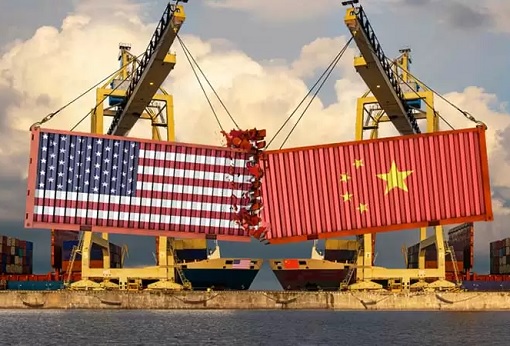
Hilariously, like a broken record, Blinken repeated precisely what his colleague Treasury Secretary Janet Yellen said during her earlier visit to China this month. He begged Beijing to fix the Chinese industrial overcapacity in key industries such as solar panels and electric vehicles, which could result in U.S. and European markets being flooded with Chinese products.
Like Blinken, President Joe Biden sent Yellen to China for her second trip in just 9 months as treasury chief – already a red flag that Washington was extremely worried about the damage of China’s exports has done to the United States. The world’s largest factory is threatening American jobs and businesses. That was the major focus of Yellen’s trip.
But why should China slash its production output to fix the U.S.’ problem? Dismissing Western complaints, deputy finance minister Liao Min lectured Yellen that imbalances between supply and demand can occur in any economy and have even happened many times in Western countries. Beijing said the complaint was nothing but a pretext to suppress China’s rise.

The emergence of China’s BYD as the world’s largest seller of electric cars since late last year has seen the Chinese leading into yet another clean-energy sector. Elon Musk, who burst into laughter during a 2011 interview when he was asked about BYD as a potential rival for Tesla, had warned this year that Chinese automakers will “demolish” global rivals without trade barriers.
Worse, in addition to more than 80% of the global solar cell exports, China now controls more than 50% the global sales of the lithium-ion battery packs used for electric vehicles, not to mention more than 20% of electric vehicles (EV). The “new three” – solar cells, lithium-ion batteries and electric vehicles – has become a buzzword in China as officials celebrate the country’s new exports.
Not only Beijing ignores Washington’s appeal to cut the so-called overcapacity, China said during Yellen’s visit that its industrial drive can benefit overseas markets, therefore, the Chinese Ministry of Industry and Information Technology would instead increase efforts to encourage the country’s EV companies to expand overseas – especially in developing countries.
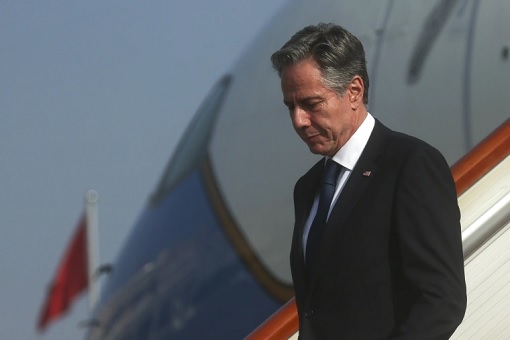
In a clear demonstration of forked tongue, Mr Blinken reaffirmed Washington’s support for the “One China” policy, where the U.S. recognises and has formal ties with China rather than the island of Taiwan. China maintains that the island is considered a breakaway province, which must be reunited by force if necessary. Yet, before Blinken’s arrival, the U.S. approved US$8 billion in aid for Taiwan.
The U.S. Secretary of State also reiterates America’s “ironclad” support for the Philippines in their dispute over the South China Sea. On April 11, the U.S. military confirmed that it had placed a mid-range capability “Typhoon” missile system on northern Luzon in the Philippines – the first time since the Cold War that the U.S. deployed such a system in Asia.
The land-based Typhon launcher can fire various types of missiles, including the 450-kilometres-range SM-6 supersonic missile, and the Tomahawk cruise missile (a maximum range of 2,500 kilometers). The deployment of the system would be a direct threat to China, the same way the U.S. deployed its anti-missile system – Terminal High Altitude Area Defense (THAAD) – to South Korea in 2017.
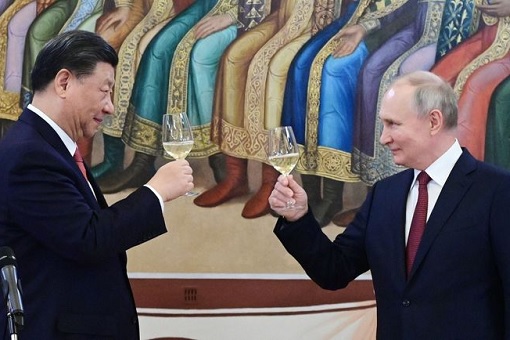
But the primary goal of Blinken’s visit to China was to warn about its support for Russia’s war against Ukraine, the same warning issued by Yellen during her visit. She warned that Chinese companies could face “significant consequences” if they provide material support for Kremlin in the Russia-Ukraine War. It’s childish if the U.S. thinks China needs its permission to choose its friends.
Neither the U.S. can provide evidence, nor can prove that China supplies lethal weapons to Russia. However, that didn’t stop Blinken from accusing Beijing of providing machine tools, microelectronics and other dual-use items that make it the “top supplier” of Russia’s defence industrial base. He said – “Russia would struggle to sustain its assault on Ukraine without China’s support.”
So, China cannot supply weapons indirectly to Russia, but the U.S. can supply weapons directly to Taiwan? Amusingly, Blinken also begged President Xi, whom Joe Biden had ridiculed and insulted as a “dictator”, to discourage Iran and others from escalating tensions in the Middle East – an admission that China’s influence has been rapidly expanding to the extent that even military superpower United States needs its help.
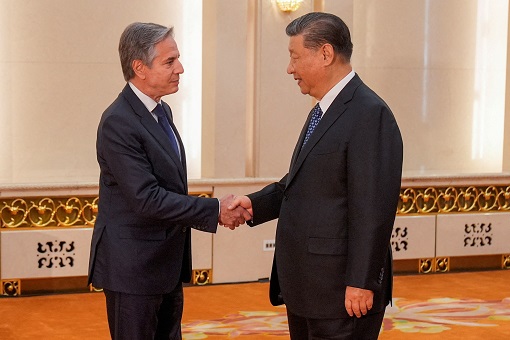
The frequent trips by both Blinken and Yellen to Beijing also suggest that the U.S. is losing its proxy war in Ukraine – even after the Senate approved a whopping US$61 billion of aid for Ukraine. Crucially, it shows that the U.S.’ toolbox is running out of effective options to punish the Chinese government for disobedience. Its favourite weapon – sanction – isn’t working anymore.
On the contrary, Blinken’s visit further proves that the Chinese support for Russian was the right thing to do. Now, Beijing is more determined to help Moscow because the U.S. is trying to encircle China by constructing an interlocking network of alliances around it – and Russia is giving the U.S. the hard time. When your enemy is trying to suppress and bully you, your enemy’s enemy is your friend.
Even before Blinken’s arrival, China’s foreign ministry had already pre-emptively told the U.S. Secretary of State not to waste his time. Spokesperson Wang Wenbin said – “China’s right to conduct normal trade and economic exchanges with Russia and other countries in the world on the basis of equality and mutual benefit should not be interfered with or disrupted. China’s legitimate and lawful rights and interests should not be infringed on.”
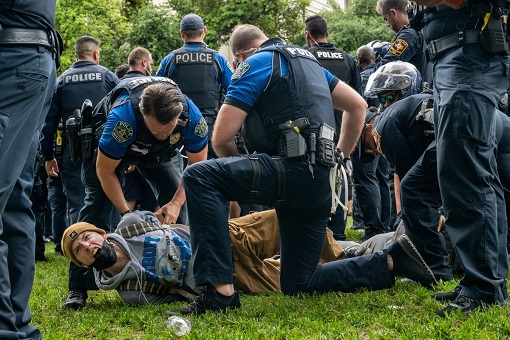
The best part was when the U.S. lectured China about the erosion of Hong Kong’s autonomy, and human rights abuses in Tibet. Perhaps Blinken should take care of his own backyard first as the world’s most influential democracy – the United States – is plagued and tainted with brutal police crackdown on demonstrations involving pro-Palestinian university students, leading to hundreds of arrests.
Former Speaker Nancy Pelosi once referred to the Hong Kong demonstration in 2019 as “a beautiful sight to behold”. The same “beautiful sight” then took place in the U.S. in 2020 when Trump supporters stormed the Capitol Hill. Today, the U.S. is cracking down on peaceful protesters, the same crackdown in Hong Kong which U.S. lawmakers had condemned as violations of free speech and political freedoms.
Other Articles That May Interest You …
- Bullying Won’t Work – Yellen Begs China To Cut Overcapacity To Save US Workers, Whilst Threatens Beijing Not To Support Russia
- BYD Beats Tesla Again – How The U.S. Carmaker Lost Its Crown As World’s Top Electric Vehicles Manufacturer
- China Finally Fights Back – Export Controls On Metals Critical In Chip Manufacturing Could Checkmate U.S. Tech War
- De-Dollarization Going Global – Why This Ex-Goldman Chief Economist Encourages BRICS To Challenge US Dollar Dominance
- Moscow & Beijing Laughing All The Way To The Bank – How China Makes Easy Money Reselling Russian Gas To Europe
- Trade Surplus Of $535 Billion – Not Even The U.S. Trade War Or Covid Pandemic Can Destroy China Economic Powerhouse
- Five Eyes Alliance Plans To Teach China A Lesson With Economic Sanctions – But It’s Easier Said Than Done
- Economists Thought China’s Economy Depends On The World – But McKinsey Research Shows Otherwise
- What Trump Doesn’t Want His Supporters To Know – China Lowered Tariffs To Everyone Except The U.S.
- From Trade War To Tech War – After 5G Technology, The US Aims To Cripple China’s Artificial Intelligence
- China’s New Message To The U.S. – “Negotiate – Sure!”, “Fight – Anytime!”, “Bully Us – Dream On!”

|
|
April 30th, 2024 by financetwitter
|


|

|

|

|

|

|






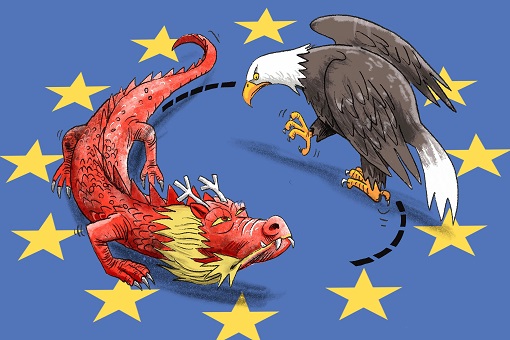





















Comments
Add your comment now.
Leave a Reply